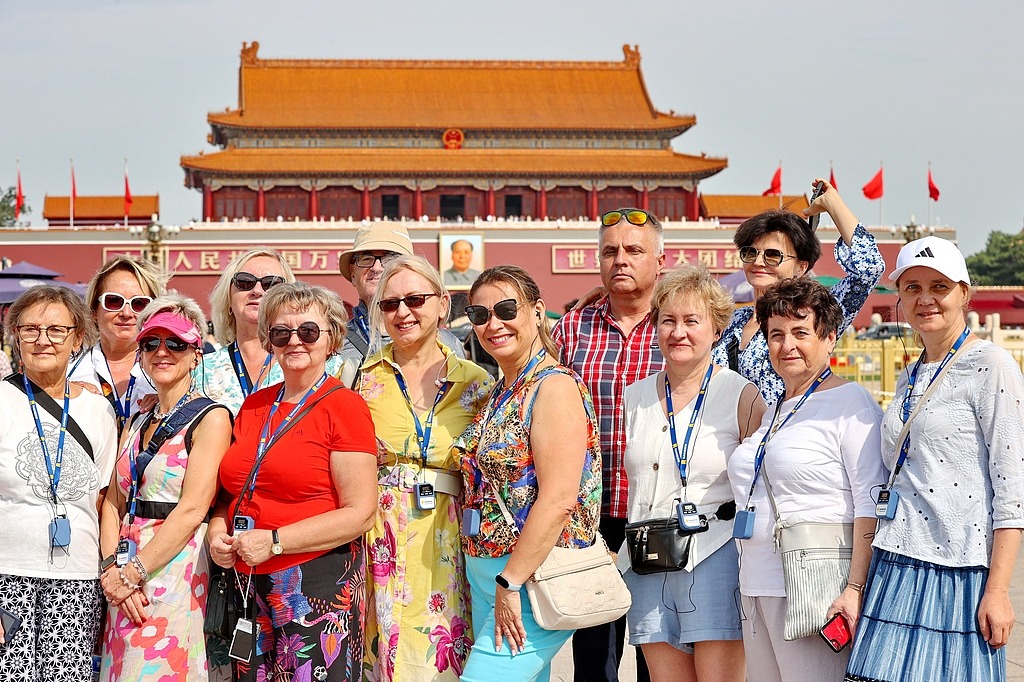China's International Development Cooperation in the New Era
China Daily | Updated: 2021-01-11 08:01
4. Quality Education
Education is the foundation of development. China has been assisting other developing countries in providing fairer access to better education, by opening schools, training teachers, and increasing scholarships.
-Supporting basic education. Access to good education is the common aspiration of all children and teens in developing countries. It is also an important means to improve population quality and advance national development. In Nepal, Armenia, Mozambique, Namibia, Peru and Uruguay, China assisted in the construction of a number of primary and secondary schools, and offered computers, lab equipment, stationery and sporting goods to improve their basic education conditions.
In South Sudan, China provided technical assistance in education, including compiling customized primary school textbooks on mathematics, English and science, and printing 1.3 million copies of them for 150,000 teachers and students. In North Macedonia, China provided distance education equipment to 27 schools, helping improve local education, particularly in mountainous and rural areas, and promote balanced distribution of education resources.
-Developing higher education. China has been assisting other countries in improving higher education facilities and training high-caliber talent. China assisted construction projects such as the Emalus Campus of the University of the South Pacific in Vanuatu, the Malawi University of Science and Technology, the teaching building of the Chinese Department at Kabul University in Afghanistan, the library at the University of Dar es Salaam in Tanzania, and the Kabala Campus of the University of Bamako in Mali. At Jomo Kenyatta University of Agriculture and Technology in Kenya, China helped establish the Sino-Africa Joint Research Centre, offering courses on the protection and utilization of biodiversity and remote sensing of natural resources to improve local technology levels.
China has provided part-time degree and non-degree programs for foreign trainees. Since 2013, the Chinese government has sponsored more than 4,300 people from other developing countries to obtain master's and doctoral degrees in China. To strengthen research cooperation and academic exchanges with partner countries to jointly train high-caliber personnel, China has launched the"20+20" Plan for higher education cooperation with Africa, and established the Atomic Energy Scholarship of China.
-Promoting vocational education. Vocational education is an important means for developing countries to generate demographic dividends and increase employment. In Laos, Cambodia, Nepal, Myanmar, Pakistan, Afghanistan, Rwanda, Uganda, Malawi, Egypt, Sudan, Liberia, Equatorial Guinea and Vanuatu, China helped set up technical schools and vocational training centers. In Azerbaijan, Ethiopia and Madagascar, China provided material support for improving their vocational and technical education.
The Omdurman Friendship Center for Vocational Training, supported by China, has become Sudan's national vocational training base for teachers. In Djibouti and Egypt, China has established Lu Ban workshops to provide practical technical training to local youth through paired cooperation with Chinese vocational schools. China's technical assistance to the vocational training center in Burkina Faso has helped boost the local vocational education market.
5. Gender Equality
Women are an important driving force for social progress. China has assisted other developing countries in promoting women's development, creating more opportunities for women to succeed in life.
-Safeguarding women's rights and interests. China has begun to implement the 100 maternal and child health care projects in developing countries, initiated by President Xi Jinping at the summits celebrating the UN's 70th anniversary in 2015. Some of these projects are already in place in Cambodia, Sierra Leone, Malawi and Cape Verde, effectively ensuring basic health care services for local women.
In Zimbabwe, China launched a program for the prevention and treatment of cervical diseases, donated medicines and equipment for early diagnosis and treatment, and dispatched specialists to improve the expertise of local medical staff. China provided training programs to some countries on maternal and child health care, to help improve their clinical services in obstetrics and neonatology.
-Empowering women. China has reinforced its efforts to assist training for women in other developing countries, promoting vocational and technical training to increase women's employment and their participation in political and economic activities.
Since 2013, China has offered over 60 capacity development and technical training programs for women in developing countries, and provided part-time degree and non-degrees programs on women's leadership and social development, aiming to expand female officials' capacity to participate in political and economic activities.
6. Infrastructure
China has assisted other developing countries in building public facilities and energy infrastructure, enabling their people to enjoy a better life.
-Supporting the construction of public facilities. China aided the maintenance and renovation of public facilities such as the Algiers Opera House in Algeria, the National Wrestling Arena and the Museum of Black Civilizations in Senegal, the Culture Palace of Abidjan in Côte d'Ivoire, and the Cotonou Convention Center in Benin. It provided assistance to some countries and the African Union in building conference centers and support facilities. It assisted Grenada, Guinea-Bissau and Tunisia in building, repairing and upgrading sports venues. All these projects aim to increase cultural and sporting activities in these countries and regions and enrich local cultural life.
The Development Center for Children with Disabilities in Mongolia, constructed with China's assistance, is the largest multi-functional rehabilitation center of its kind in the country, and is renowned as "a happiness project".
-Improving urban living environment. In Sierra Leone, Burundi, Fiji, Papua New Guinea, Nepal, the Philippines, the Federated States of Micronesia, Kyrgyzstan, Tajikistan and Serbia, China helped build urban arterial roads and upgrade congested sections to ease traffic flow. The China-Maldives Friendship Bridge, built with China's assistance to connect three adjacent islands, has become an artery of traffic in the Male Atoll, providing an alternative to the ferry as the only means of local transport.
In Syria, China provided 100 buses to expand urban transport capacity, which has facilitated travel and reconstruction in the recipient cities. China-aided projects on road repair and residential drainage in Sao Tome and Principe and those on water supply and sewage treatment in Kurunegala, Sri Lanka, have addressed urban waterlogging and separated sewage from rainwater, thereby reducing pollution and improving local life quality.
-Expanding energy access. Depending on resource availability, China has assisted other countries in developing hydro, solar, wind, nuclear and geothermal power, and helped them to build power transmission, transformation and distribution networks.
In Cuba, China assisted the construction of a solar power station with an installed capacity of 9 MW and an annual power output of 12.85 million kWh, which filled a sizable gap in the local power supply. China aided Kyrgyzstan in rebuilding its power grid in the south, aided Tajikistan in a 500 kV power transmission and transformation project in the Districts of Republican Subordination, aided Laos in building a 230 kV power transmission line between Thavieng and Laksao, and aided Zambia in building a power transmission line between Kariba North and Kafue West. These projects have improved power grid connectivity in these countries, and played an important role in boosting their energy independence and industrialization.
























